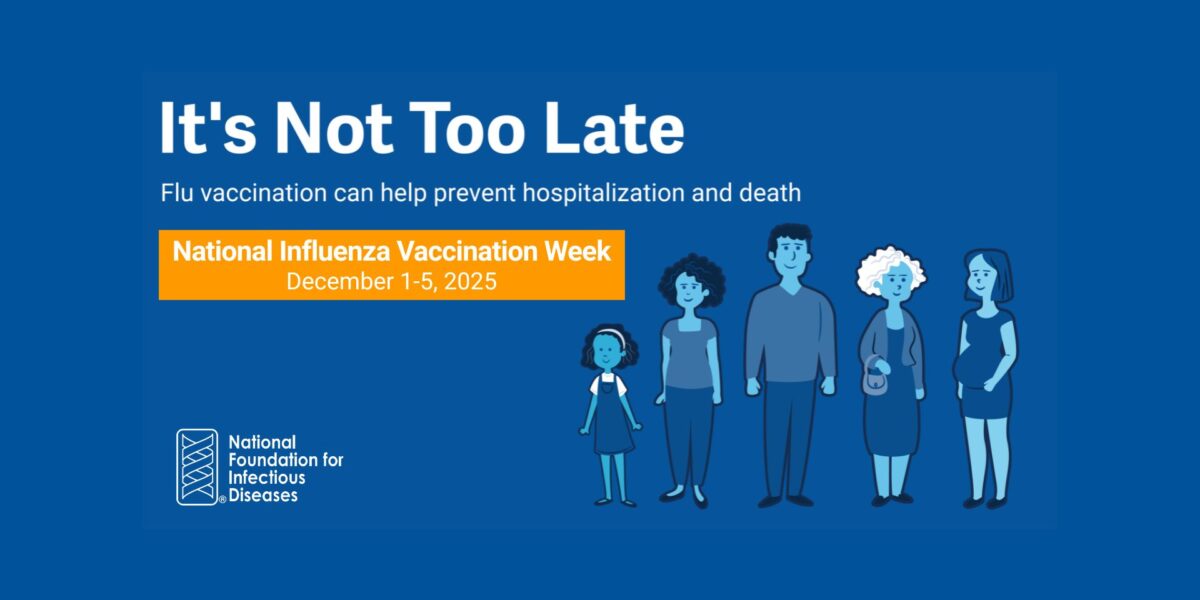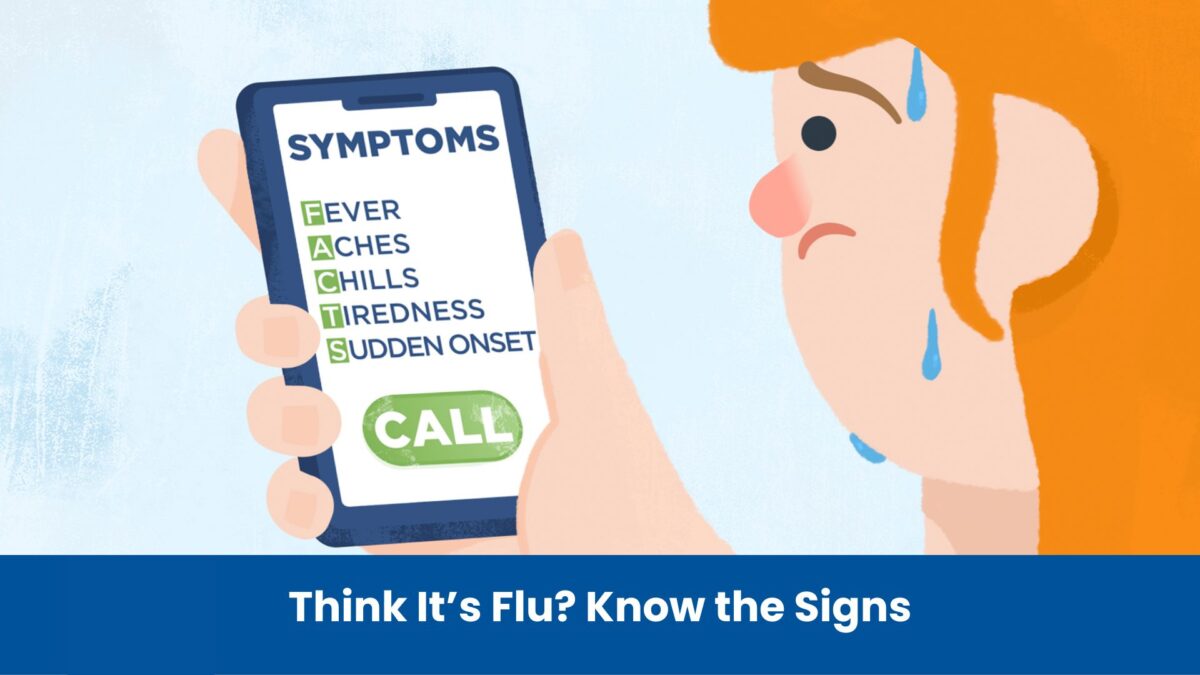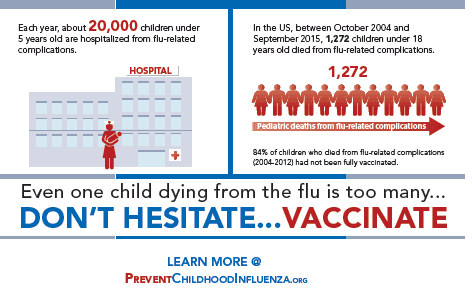
To highlight the importance of annual influenza (flu) vaccination, the National Foundation for Infectious Diseases (NFID) is hosting a 2017 National Influenza Vaccination Week (NIVW) blog relay, featuring a daily guest post from an immunization champion/organization.
Special thanks to Wendy Sue Swanson, MD, MBE, pediatrician, author of Seattle Mama Doc blog, and Chief of Digital Innovation at Seattle Children’s Hospital, for this guest post on tips for healthcare professionals to effectively communicate with parents about the flu vaccine.
Parents have more health information at their fingertips than ever before. They may research vaccine information online, but still come to providers with questions after reading narratives, examples, scientific data, and case reports. As pediatricians, family doctors, public health advocates, clinicians, nurses, and medical assistants, we remain parents’ most trusted source of information about vaccines. We have the profound opportunity to help support parents in understanding and confidently choosing to vaccinate their children on schedule and on time. 
Here are a few tips to help communicate effectively:
- Take time to listen
It’s easy to get distracted and succumb to the urge to multi-task or chart while a parent talks. Instead, when it comes to conversations about the flu vaccine, one of the most powerful things we can do is give parents our attention so they know their concern is as important as it feels. Keep eye contact, restate their questions to ensure you understand their point of view, and pause to prepare a thoughtful reply. Taking the time to show you are listening will likely play a major role in helping parents choose vaccination.
- Passion yes, but empathy, of course, too
There is no question that we need to be passionate about why we recommend the flu vaccine. But we have to be empathetic to how it feels to be concerned about the vaccine’s safety. Better to ask open-ended questions and encourage parents to speak up, even when they seem hesitant or concerned about your disagreement with their ideas on waiting or declining vaccines.
- Keep the conversation going
In today’s digital age, it is not uncommon for parents to come to us with a list of questions or information from the internet. How we react is important. This isn’t a lack of respect for your ideas or the recommended schedules by the American Academy of Pediatrics (AAP) or the Centers for Disease Control and Prevention (CDC)—this is simply earnest concern, interest, and a drive to understand what is best for their children. It’s important to acknowledge that spending time to research vaccines online means that this is an important topic for the parents. Appearing dismissive of these questions may shut down important dialogue and erode trust.
- Balance science and anecdote
Pediatricians can feel frustrated with the ongoing task of discussing influenza vaccine science in the exam room. It’s certainly our job, and it can be arduous. It’s difficult to have to defend science against anecdote. Emotion usually trumps the numbers you share so watch and listen. Be prepared to use a mix of the science behind vaccination and anecdotal information to effectively address parents’ questions. Tell parents why and how you immunize yourself and your family each year against to protect against flu.
We must always be honest about the known side effects of flu vaccines (soreness at site injection, 10-30% of children under age 2 years will get a fever), but we should also remind parents of the overwhelming benefits and protection it provides. Talk about the real complications the flu virus can cause as much as vaccine side effects. Common complications of influenza include viral or bacterial pneumonia, dehydration, ear infections, and sinus infections, especially in children. High fever, muscle aches, wheezing, and overall, feeling terrible are also common. Research has found that mothers with high knowledge of real disease prior to the vaccination are more willing to vaccinate.
- Respect parents’ authority
Many parents today want to work in partnership with us as their child’s clinician. By talking respectfully with parents about flu vaccine concerns, you can build on this partnership, build trust, and support parents in the decision to choose vaccination. Our privileged responsibility is to listen to parental fear and connect families with resources that soothe. This really is why we went to medical school.
- Reduce the stress of shots
Both parents and children often find vaccinations a stressful experience. You can reinforce that crying is a normal response for a child and suggest that they stay calm so that their baby or toddler does not become aware of their stress. Make sure parents know that their child’s fear may be an actual phobia, treat it with great respect. It’s empathy, not logic, that works best in allaying this fear. I recommend the “cough trick,” where the patient coughs while getting a shot. Coughing distracts from the shot discomfort and the patient also knows getting the shot only lasts as long as the cough lasts.
Remember the most wonderful privilege is that parents trust really do us to help them protect their little ones…
Additional Resources:
- Seattle Mama Doc Blog: Online Interventions
- Seattle Mama Doc Blog: 10 Things To Know 2017-2018 Flu Shots
- CDC Flu Fighter Profile
Be sure to check NFID News each day during #NIVW to view guest blog posts, including upcoming posts about the importance of preventing flu on US college campuses and in older adults.
To join the conversation, follow NFID on Twitter, using the hashtags #NIVW and #FightFlu, like NFID on Facebook, follow NFID on Instagram, join the NFID Linkedin Group, and subscribe to NFID Updates.
Related Posts

There’s Still Time: #GetVaccinated to Help #FightFlu
NFID and partners offer resources for National Influenza Vaccination Week, December 1-5, 2025, to raise awareness about the importance annual flu vaccination …

What You Need To Know This Respiratory Season
From antivirals to immunization, here’s what you need to know to help protect yourself and others from flu, COVID-19, RSV, and pneumococcal disease.

Staying on Track: Evidence-Based Vaccine Recommendations
Looking for trusted vaccine guidance? Read on for evidence-based immunization recommendations from professional medical groups and trusted NFID partners …

